National
Paul Wells: Perhaps Freeland isn’t the victim here. Perhaps it’s Freeland who set Trudeau up
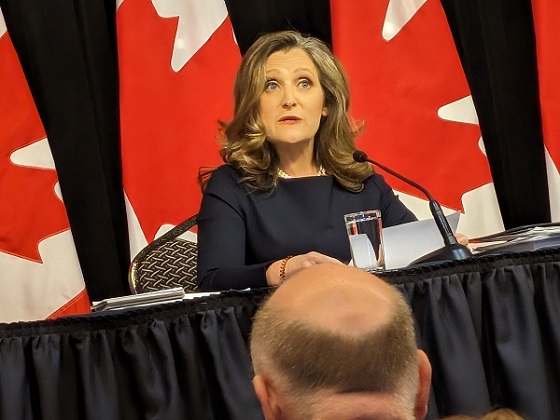
The minister of everything
Did Trudeau just blink?
And now we interrupt my own previously-quiet Sunday night for some rampant speculation. There is a lot going on. I am left to generate hypotheses that might explain some of it.
On Sunday night we watched the last two episodes of The Madness on Netflix (stylish but not entirely persuasive), then it came time to check the headlines, as one does in Ottawa after Netflix.
Holy frijoles: Sean Fraser is said to be leaving the federal cabinet and, when the time comes, federal politics altogether. This is surprising but plausible: the 338Canada projection (which, always remember, is not based on local polling, it’s just an extrapolation, but still) has him 17 points behind the Conservatives in his Central Nova riding, he’s got young children, and one wiseacre wrote 14 months ago that we should expect talent to leave this government:
|
But that wasn’t even nearly the night’s biggest big-if-true story: John Ivison is reporting from his tropical outpost that Chrystia Freeland’s getting ready to deliver a fiscal update without the profligate, unworkable free-cheque plan. That’s the $250 “working Canadians rebate” described in this backgrounder, which I should now maybe screenshoot because who knows whether it’ll be there in the morning.
Instead I screenshot Chris Selley on X, who is reliably entertaining:
But here’s where the speculation begins. I’m not sure “they” tried and failed. I think there’s another hypothesis that fits the available data.
The double-reverse Morneau?
It’s been less than a week since the Globe published an article on “tensions” between the PMO and Freeland’s office over “GST holiday, $250 cheques.” The piece, by Globe Ottawa bureau chief Bob Fife and reporter Marieke Walsh, quoted many unnamed sources to the effect that “tensions have risen between Ms. Freeland’s office and the PMO over spending.”
You might say all of this appears to be similar to what happened with Ms. Freeland’s predecessor, Bill Morneau, before he departed the government in 2020. If so, you must be one senior Liberal, because Fife and Walsh quote “one senior Liberal” who says the current situation “appears to be similar to what happened with Ms. Freeland’s predecessor, Bill Morneau, before he departed the government in 2020.”
And indeed, the story was strongly reminiscent of the extraordinary moment, which I can still hardly believe, when a bored Prime Minister had his lackeys organize a leak campaign against his own finance minister during a global fiscal calamity in 2020. Then as now, reporters were breathlessly informed that Trudeau had, at some point, even managed to get The Great Mark Carney on the phone, as if that could justify anything.
(Indeed, one of the underappreciated aspects of Trudeau’s 2020 ejection of Morneau was the way Carney wandered through the story, entirely oblivious, before simply vanishing.)
So Tuesday’s Fife/Walsh story triggered much outrage in Ottawa circles. How dare the PMO set up another finance minister? And a woman at that, even as Trudeau himself was parading as a champion of feminism?
But if Ivison is correct that the cheques will be gone from Monday’s fall update, that leaves open a very different possibility.
Perhaps Freeland isn’t the victim here. Perhaps it’s Freeland who set Trudeau up.
Subscribe to Paul Wells at $5 a month or $50 a year, and lock in that rate before I hike it in the New Year.
Indeed, the quotes nearest the top of Fife and Walsh’s story suggest that at least some of their sources are not mere PMO conduits, but rather people who have spent some time energetically rolling their eyes at the PM’s behaviour. “The sources say the idea for a sales-tax break… was driven by the Prime Minister’s Office (PMO), as was the pledge to send $250 benefit cheques,” the reporters write. “The Finance Department viewed the $6.28-billion plan as fiscally unwise, with one source saying Finance officials described the GST holiday as making little economic sense.”
The Globe story does point out that the NDP supports the (also profligate, also unworkable) point-of-sale GST “holiday) but not the $250 cheques, because the NDP, like the Bloc, wants the cheques to go to more people, including seniors. My revered colleague Occam of Razor would say that’s the only explanation anyone needs for the apparent climbdown on the cheques: it’s only prudent to take everything out of a fiscal plan that might lead to a minority government’s defeat in the Commons.
But the tone of Tuesday’s Globe story, the moment of its appearance, and the apparent result — the wreck of the cheque plan — suggest this may be a case of something everyone in Ottawa has seen many times during the Trudeau government: a tactical decision to take a private dispute public, because if there’s one thing that can get this PMO’s attention, it’s an embarrassing headline.
Again, I need to emphasize: I don’t know Fife and Walsh’s sources or their motives. I have found that speculation about a reporter’s anonymous sources is usually just bad guesswork. And the repeated mentions in the Globe story of its “ten sources” suggests the reporters pieced together their account from several sources, that they weren’t passive conduits for anyone.
But as I’ve written a few times in the past, many organizations that deal with this government learned along ago that it is pointless to hope that their concerns will be addressed through routine channels. Instead, you have a much better chance of getting satisfaction by escalating your file out of a dusty cabinet and onto the front page of the Globe and Mail. As I wrote here more than two years ago:
“Everybody knows that if the government of Canada is doing something they don’t like, they should tell a reporter about it, because the government of Canada will instantly reverse course to make the bad headline stop hurting. Issues management squads have the only autonomy in this government. They react to headlines as Dracula did to garlic. This realization is now baked into the procedural book of everyone who deals with this government in any capacity — and, plainly, of increasing numbers of people who work inside it.”
Imagine reading Tuesday’s Globe story if you work in the PMO and you’re not actively scheming to get Chrystia Freeland out of the government. The story would be full of surprises for you: (1) the cheque plan is despised by the Finance Department; (2) somebody is mighty eager to make sure everyone knows it was your idea; (3) somebody is talking about the government losing its finance minister. If you don’t have Carney lined up to take the job, the prospect of a looming vacancy starts to look more like a threat than an opportunity.
Buy someone a gift subscription
I first met Chrystia Freeland in 1999, when she began a brief stint as deputy editor of the Globe and Mail. (Fife was then working for the Globe’s crosstown rivals at the National Post, as was I.) To say the least, I’ve seen little in recent years that suggests Freeland is a superb communications tactician. But brushing a stunned or recalcitrant PMO back by escalating a story onto the Globe’s front page doesn’t take a deft touch, either. These days, it seems just about everyone can do it.
Anyway, that’s my speculation. Here’s what we know, or will if these stories are confirmed on Monday: Trudeau has formidable resources available to keep himself in his cabinet, but he has no particular such influence over his ministers. All of whom are now being reminded of their autonomy by the example of Fraser. And a multi-billion-dollar scheme that seemed, only days ago, to be the point of the fall update now seems unlikely to be implemented.
Invite your friends and earn rewards
Business
Parliamentary Budget Officer begs Carney to cut back on spending
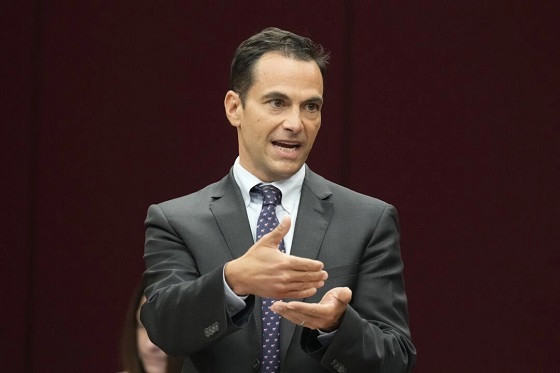
PBO slices through Carney’s creative accounting
The Canadian Taxpayers Federation is calling on Prime Minister Mark Carney to cut spending following today’s bombshell Parliamentary Budget Officer report that criticizes the government’s definition of capital spending and promise to balance the operating budget.
“The reality is that Carney is continuing on a course of unaffordable borrowing and the PBO report shows government messaging about ‘balancing the operating budget’ is not credible,” said Franco Terrazzano, CTF Federal Director. “Carney is using creative accounting to hide the spiralling debt.”
Carney’s Budget 2025 splits the budget into operating and capital spending and promises to balance the operating budget by 2028-29.
However, today’s PBO budget report states that Carney’s definition of capital spending is “overly expansive.” Without using that “overly expansive” definition of capital spending, the government would run an $18 billion operating deficit in 2028-29, according to the PBO.
“Based on our definition, capital investments would total $217.3 billion over 2024-25 to 2029-30, which is approximately 30 per cent ($94 billion) lower compared to Budget 2025,” according to the PBO. “Moreover, based on our definition, the operating balance in Budget 2025 would remain in a deficit position over 2024-25 to 2029-30.”
The PBO states that the Carney government is using “a definition of capital investment that expands beyond the current treatment in the Public Accounts and international practice.” The report specifically points out that “by including corporate income tax expenditures, investment tax credits and operating (production) subsidies, the framework blends policy measures with capital formation.”
The federal government plans to borrow about $80 billion this year, according to Budget 2025. Carney has no plan stop borrowing money and balance the budget. Debt interest charges will cost taxpayers $55.6 billion this year, which is more than the federal government will send to the provinces in health transfers ($54.7 billion) or collect through the GST ($54.4 billion).
“Carney isn’t balancing anything when he borrows tens of billions of dollars every year,” Terrazzano said. “Instead of applying creative accounting to the budget numbers, Carney needs to cut spending and debt.”
Education
Why classroom size isn’t the issue teacher unions think it is

This article supplied by Troy Media.
The real challenge is managing classrooms with wide-ranging student needs, from special education to language barriers
Teachers’ unions have long pushed for smaller class sizes, but the real challenge in schools isn’t how many students are in the room—it’s how complex those classrooms have become. A class with a high proportion of special needs students, a wide range of academic levels or several students learning English as a second language can be far more difficult to teach than a larger class
where students are functioning at a similar level.
Earlier this year, for example, the Elementary Teachers’ Federation of Ontario announced that smaller class sizes would be its top bargaining priority in this fall’s negotiations.
It’s not hard to see why unions want smaller classes. Teaching fewer students is generally easier than teaching more students, which reduces the workload of teachers. In addition, smaller classes require hiring more teachers, and this amounts to a significant financial gain for teachers’ unions. Each teacher pays union dues as part of membership.
However, there are good reasons to question the emphasis on class size. To begin with, reducing class size is prohibitively expensive. Teacher salaries make up the largest percentage of education spending, and hiring more teachers will significantly increase the amount of money spent on salaries.
Now, this money could be well spent if it led to a dramatic increase in student learning. But it likely wouldn’t. That’s because while research shows that smaller class sizes have a moderately beneficial impact on the academic performance of early years students, there is little evidence of a similar benefit for older students. Plus, to get a significant academic benefit, class sizes need to be reduced to 17 students or fewer, and this is simply not financially feasible.
In addition, not only does reducing class sizes mean spending more money on teacher compensation (including salaries, pensions and benefits), but it also leads to a decline in average teacher experience and qualifications, particularly during teacher shortages.
As a case in point, when the state of California implemented a K-3 class-size reduction program in 1996, inexperienced or uncertified teachers were hired to fill many of the new teaching positions. In the end, California spent a large amount of money for little measurable improvement in academic performance. Ontario, or any other province, would risk repeating California’s costly experience.
Besides, anyone with a reasonable amount of teaching experience knows that classroom complexity is a much more important issue than class size. Smaller classes with a high percentage of special needs students are considerably more difficult to teach than larger classes where students all function at a similar academic level.
The good news is that some teachers’ unions have shifted their focus from class size to classroom complexity. For example, during the recent labour dispute between the Saskatchewan Teachers’ Federation (STF) and the Saskatchewan government, the STF demanded that a classroom complexity article be included in the provincial collective agreement. After the dispute went to binding arbitration, the arbitrator agreed with the STF’s request.
Consequently, Saskatchewan’s new collective agreement states, among other things, that schools with 150 or more students will receive an additional full-time teacher who can be used to provide extra support to students with complex needs. This means that an extra 500 teachers will be hired across Saskatchewan.
While this is obviously a significant expenditure, it is considerably more affordable than arbitrarily reducing class sizes across the province. By making classroom complexity its primary focus, the STF has taken an important first step because the issue of classroom complexity isn’t going away.
Obviously, Saskatchewan’s new collective agreement is far from a panacea, because there is no guarantee that principals will make the most efficient use of these additional teachers.
Nevertheless, there are potential benefits that could come from this new collective agreement. By getting classroom complexity into the collective agreement, the STF has ensured that this issue will be on the table for the next round of bargaining. This could lead to policy changes that go beyond hiring a few additional teachers.
Specifically, it might be time to re-examine the wholesale adoption of placing most students, including those with special needs, in regular classrooms, since this policy is largely driving the increase in diverse student needs. While every child has the right to an education, there’s no need for this education to look the same for everyone. Although most students benefit from being part of regular academic classes, some students would learn better in a different setting that takes their individual needs into consideration.
Teachers across Canada should be grateful that the STF has taken a step in the right direction by moving beyond the simplistic demand for smaller class sizes by focusing instead on the more important issue of diverse student needs.
Michael Zwaagstra is a senior fellow with the Frontier Centre for Public Policy.
Troy Media empowers Canadian community news outlets by providing independent, insightful analysis and commentary. Our mission is to support local media in helping Canadians stay informed and engaged by delivering reliable content that strengthens community connections and deepens understanding across the country
-
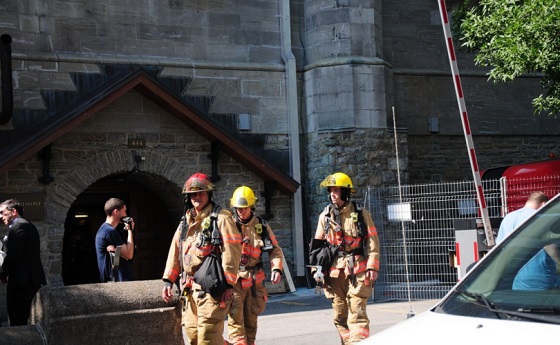
 National2 days ago
National2 days agoConservative bill would increase penalties for attacks on places of worship in Canada
-

 Frontier Centre for Public Policy1 day ago
Frontier Centre for Public Policy1 day agoRichmond Mayor Warns Property Owners That The Cowichan Case Puts Their Titles At Risk
-
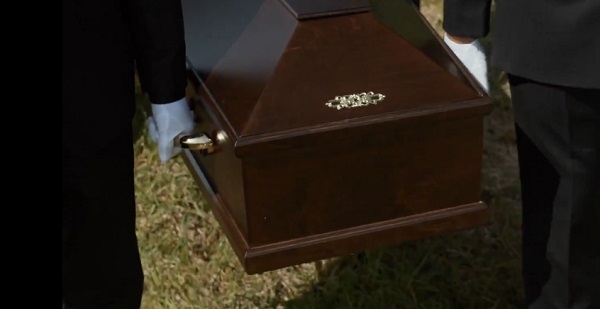
 armed forces2 days ago
armed forces2 days agoCanadian veteran says she knows at least 20 service members who were offered euthanasia
-
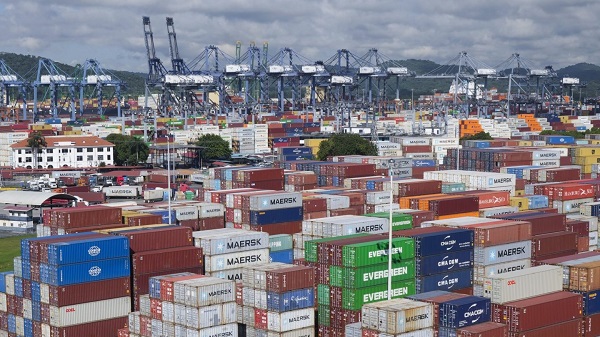
 Alberta2 days ago
Alberta2 days agoHow economic corridors could shape a stronger Canadian future
-

 Business1 day ago
Business1 day agoMark Carney Seeks to Replace Fiscal Watchdog with Loyal Lapdog
-

 Business1 day ago
Business1 day agoSluggish homebuilding will have far-reaching effects on Canada’s economy
-

 COVID-191 day ago
COVID-191 day agoMajor new studies link COVID shots to kidney disease, respiratory problems
-
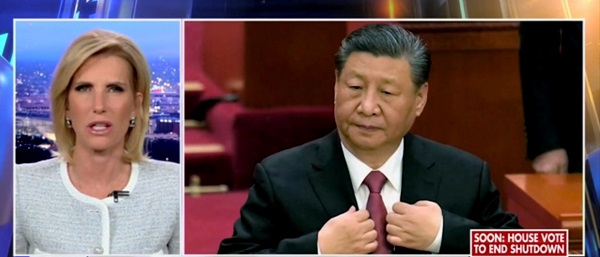
 Daily Caller2 days ago
Daily Caller2 days agoLaura Ingraham’s Viral Clash With Trump Prompts Her To Tell Real Reasons China Sends Students To US












